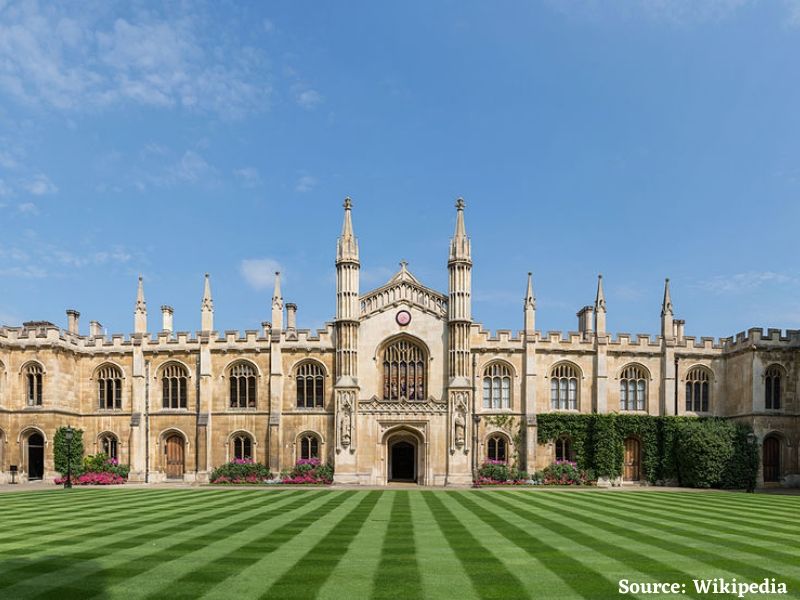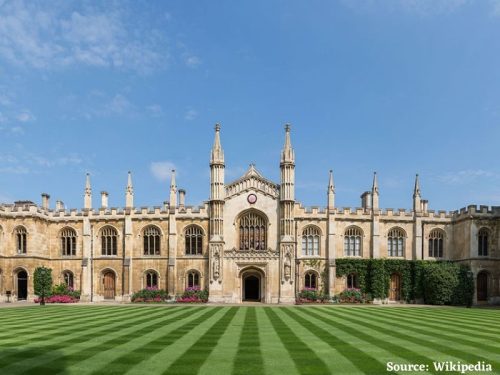University of Cambridge, UK
Highly prized for its teaching excellence and research, University of Cambridge, UK is routinely ranked among the top five of the worlds best varsities. In the the-QS world university rankings 2009 it was ranked second, behind Harvard
 The second oldest (after Oxford) university of the English speaking world, over the past 800 years, the University of Cambridge (estb. 1209), has built — and perhaps more important, maintained — its reputation as one of the worlds most respected and admired institutions of undergrad and higher education. Highly prized for its teaching excellence and research, Cambridge University is routinely ranked among the top five in the league tables of the worlds best varsities. For instance, in the 2009 Times Higher Education-QS World University Rankings, Cambridge was ranked second, behind Harvard. In the 2008 Academic Ranking of World Universities compiled by the Shanghai Jiao Tong University, China, Cambridge was ranked fourth.
The second oldest (after Oxford) university of the English speaking world, over the past 800 years, the University of Cambridge (estb. 1209), has built — and perhaps more important, maintained — its reputation as one of the worlds most respected and admired institutions of undergrad and higher education. Highly prized for its teaching excellence and research, Cambridge University is routinely ranked among the top five in the league tables of the worlds best varsities. For instance, in the 2009 Times Higher Education-QS World University Rankings, Cambridge was ranked second, behind Harvard. In the 2008 Academic Ranking of World Universities compiled by the Shanghai Jiao Tong University, China, Cambridge was ranked fourth.
Founded in 1209 by a group of scholars who shook the dust of Oxford University from their feet after a dispute with the townsfolk, Cambridge nevertheless has many commonalities with its parent varsity and the two are commonly referred to as Oxbridge universities. Like Oxford, Cambridge is also a collegiate university comprising 31 autonomous colleges, 29 of whom admit under-graduate students. Under the common Oxbridge schema, each college is an independent institution with its own property and income. The colleges also appoint their own staff and are responsible for selecting students for admission, within the framework of university regulations. The onus of teaching all students is shared between the colleges and over 150 university departments, faculties and schools with all the colleges under the Cambridge umbrella awarding degrees of Cambridge University. Currently the university has an aggregate enrolment of 18,396 students and 8,614 faculty and staff.
While most of Cambridge Us 31 colleges admit a variety of students, there are some exceptions: Newnham, Murray Edwards and Lucy Cavendish are women-only colleges, while Hughes Hall, Lucy Cavendish, St. Edmunds and Wolfson bar students aged less than 21. The colleges provide essentially the same range of facilities to students: board, lodging, pastoral care and tuition under the unique Oxbridge tutorial system. Moreover each college maintains its own library, sports grounds and recreation facilities.
The secret of Cambridge’s great teaching strength is to be found in the partnership between the colleges and the university: a combination which provides superb facilities, contact with the very best minds, and the personal support to help you make the most of them. You will have an unparalleled chance to develop your academic interests, and explore plentiful opportunities for sports, drama, political and social activities, says Alison Richard, who was vice chancellor of the university until last month. (Sir Leszek Borysiewicz took charge as VC on October 1)
Cambridge. Fifty minutes north of London by rail, Cambridge (pop.22,000) is a university town with students accounting for a fifth of its population. The placid River Cam flows through with the appellation Cambridge derived from the river. A compact town, Cambridge offers a charming mix of the old and new — cobbled medieval streets and historic architecture cheek by jowl with modern buildings and contemporary shopping centres. The town also hosts four theatres, three cinemas, and two major entertainment venues — The Junction and The Corn Exchange offering varied programmes including comedy, drama, dance, concerts and club nights — apart from 119 pubs and bars.
Campus facilities. Cambridge University is a confederation of 31 colleges spread across the eponymous town. Each college is characterised by distinctive architecture combining the old and new. For instance Trinity College (estb.1546) boasts courts and buildings dating mostly to the 16th and 17th centuries, including a college library designed by Sir Christopher Wren, which backs onto the River Cam.
Collectively the university’s 58 libraries offer access to over 7 million volumes. One of the best research library networks in the world, the Cambridge University Library is a legal deposit library, which gives it legal claim to a copy of all material published in the UK and Ireland. Cambridge U is also home to nine specialist museums and collections, as well as the University Botanic Garden, all of which are open to the public.
Each Cambridge college offers an extensive range of sports facilities including playing fields, courts, boathouses and gyms. There are also over 600 student clubs and societies on campus.
Admission. Cambridge is a highly selective university. Only about 25 percent of applicants are admitted, and of these only about 10 percent are from beyond UK borders. Admission applications for Cambridge, as in the case of all universities in the UK, have to be made through the Universities and Colleges Admissions Service (UCAS). Application forms can be downloaded from www.ucas.com. Foreign students also have to submit a Cambridge Overseas Application Form (COAF) to the Cambridge college they select.
The minimum eligibility criterion for admission into Cambridge’s undergrad programmes is first class Plus Two certification. For postgraduate courses its a first class bachelors degree. In addition international students have to submit proof of proficiency in English — an overall score of 7.0 or more is required in the International English Language Test conducted by the British Council. Moreover personal interviews are an important aspect of Cambridge Us selection procedure. Usually university admissions tutors visit New Delhi to interview applicants shortlisted for admission into undergrad programmes. Interviews are generally held in mid-September.
The last date for term beginning in October 2012 is October 15 next year. For further information contact Cambridge Admissions Office, Fitzwilliam House, 32 Trumpington Street, Cambridge CB2 1QY. Tel: 01223 333308; e-mail: [email protected]; website: www.cam.ac.uk.
Accommodation. Students are guaranteed residential accommo-dation by their respective Cambridge colleges for at least three/four years. The colleges offer a variety of accommo-dation — from halls of residence to houses. The style of Cambridge rooms varies from the medieval, with little arched windows, through spacious Victorian and Edwardian to practical and modern. Students have a choice of en suite or shared bathroom facilities. In the old Oxbridge tradition, student rooms are still maintained by ‘bedders. All college housing offers laundry rooms, dining halls, computer suites and sports facilities.
Degree programmes. Cambridge Us six schools — arts and humanities, biological sciences including veterinary medicine, clinical medicine, humanities and social sciences, physical sciences, and technology — offer a wide range of undergrad and postgrad programmes (see box). Teaching is through lectures, seminars, practicals and personal tuition through the supervision system — teaching sessions for pairs or small groups of students with a subject expert, the supervisor. The tutorial system is one of the USPs of studying at Cambridge University.
Scholastic options at Cambridge
The academic degree programmes offered by the 31 constituent colleges of the university include:
Arts. Anglo-Saxon, Norse and Celtic; archaeology and anthropology; architecture; Asian and Middle Eastern studies; classics; economics; education; English; geography; history; history of art; land economy; law; linguistics; management studies; modern and medieval languages — French, German, Italian, Portuguese, Russian, Spanish; music; philosophy; politics, psychology and sociology; theology and religious studies
Sciences. Chemical engineering; computer science engineering; manufacturing engineering; mathematics; medicine; natural sciences — astrophysics, biochemistry, biological and biomedical sciences, chemistry, genetics, geological sciences, history and philosophy of science, materials science, neuroscience, pathology, pharmacology, physical sciences, physics, physiology, development and neuroscience, plant sciences, psychology, systems biology, zoology
Veterinary Medicine. Six-year course in veterinary medicine
Tuition fees (per year): £11,829-28,632
College fees (annual): £4,000-6000
Living expenses (per year): £6,000-7,500
Summiya Yasmeen
Also read: Indian students win 177 Cambridge International awards this year
















Add comment